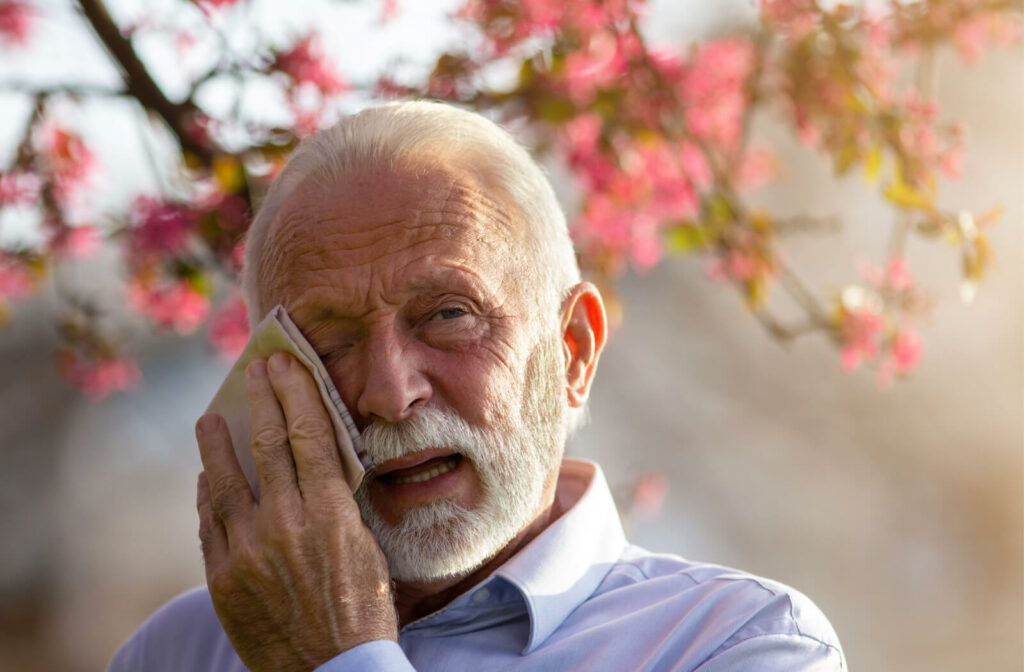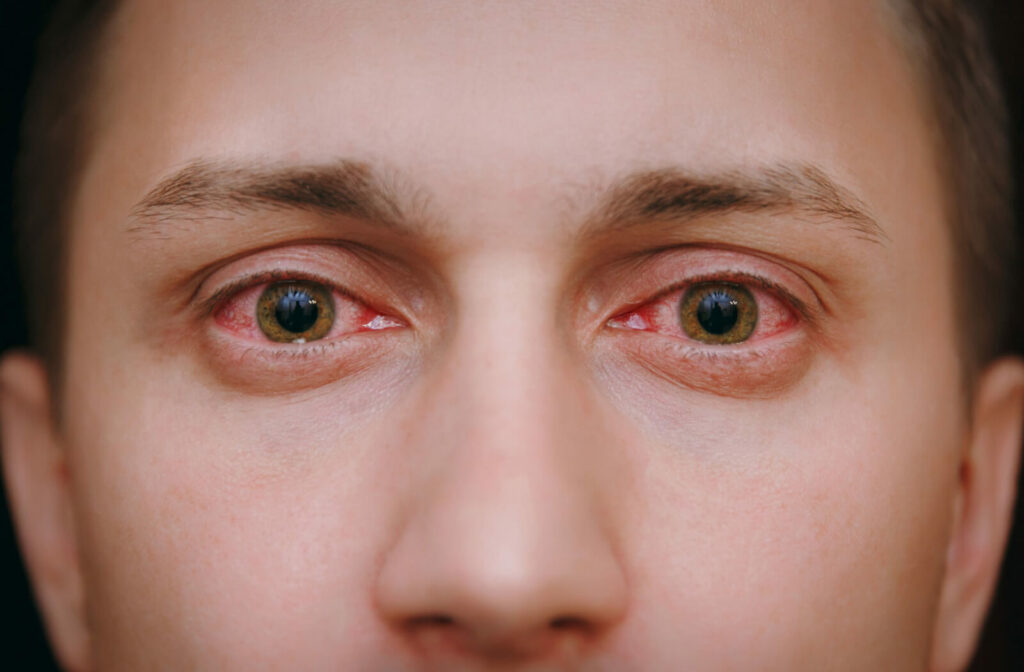Allergies are a common problem affecting more than 50 million Americans every year. While allergies can come in a variety of types, it’s generally caused by an overreaction of the immune system to substances that are normally harmless, such as pollen, dust mites, or pet dander.
The symptoms of allergies can vary depending on you and the type of allergen involved, but the common symptoms include sneezing, runny nose, itching, and, yes, dry eyes. However, dry eyes and allergies are different conditions that require different treatments.
Treating your allergies won’t necessarily relieve your dry eye if it’s due to an undiagnosed dry eye disease. An eye exam can pinpoint the exact cause of your condition before it develops into something worse.
What is Dry Eye?
Dry eye is a condition caused by an error in tear production that affects about 16 million Americans. People with dry eyes either produce too few tears or tears of poor quality. When this happens, it means your tear film, the layer of tears that protect your eyes, cannot form.
The symptoms of dry eyes can vary, but typically they include the following:
- Blurry vision
- Burning, irritated, or scratchy eyes
- The feeling of having something stuck in your eye
- Light sensitivity
- Redness
- Stringy mucus
- Watery eyes (your eyes may try to overproduce tears in response to the dry feeling)
Dry eyes can either be a short-term occurrence or an ongoing condition. Dry environments, smoke, or not blinking regularly can all cause your eyes to dry out.
Another common cause is meibomian gland dysfunction (MGD). Tiny glands, known as meibomian glands, line your eyelids and produce oils that prevent your tear film from evaporating too fast. If these glands become inflamed or blocked, you may develop MGD, leading to dry eyes.
If dry eye symptoms are left untreated, they could progress into severe conditions such as infections or corneal scarring.

Allergies & Dry Eyes
While dry eyes can be a symptom of allergies, they are different eye conditions. Have an eye doctor assess your eye health and diagnose the proper condition to ensure you get the correct treatment.
There are different types of allergic reactions depending on what allergen you’re exposed to, but even allergies that aren’t related to your eyes can affect your eye health. For example, hay fever can affect your sinuses, which can cause your eyelids to swell and disrupt the meibomian glands.
Allergies that do affect your eyes are called allergic conjunctivitis. While this condition has a similar name to pink eye (conjunctivitis), it’s not contagious. Instead, allergens or irritants affecting your eye cause it.
In addition to dry eyes, symptoms of eye allergies can include:
- Itchy eyes
- Burning or irritation
- Watery eyes
- Eyelid swelling
- Light sensitivity
- Redness
Do Antihistamines Affect Your Eyes?
The allergies themselves might not be the only factor in your dry eyes. People with allergies typically use antihistamines to help with symptoms such as runny nose, sneezy, and itchy eyes. However, these medications are also known to reduce tear production.
Using this medication could result in more irritation if you’re someone with an undiagnosed dry eye disease. You may need to supplement it with artificial tears to increase eye moisture or ask your doctor about an alternative medication.
How to Treat Dry Eyes From Allergies
An excellent first step to treating dry eyes from allergies is preventing your allergies in the first place. Try avoiding seasonal allergens or exposure to conditions that you know can trigger your allergies. Here are some steps you can take:
- Keep windows closed during high pollen periods
- Were glasses outdoors to keep pollen out of your eyes
- Use mite-proof bedding to limit exposure to dust mites
- Use a dehumidifier to control mold
- Wash your hands after petting any animal
Remember that some allergy treatments could worsen undiagnosed dry eye disease. Keep track of your symptoms so you can get a more accurate diagnosis from your doctor. If you’re looking for relief from dry eye symptoms, try some of these treatment methods:
- Use over-the-counter artificial tears
- Add omega-3 fatty acids to your diet
- Use a warm compress to soothe inflammation
- Remember to blink regularly when working on a computer screen
When Should You See a Doctor?
Because dry eyes and allergies share so many symptoms, it’s vital you get an accurate diagnosis. Allergies will usually fade in time with proper treatment, but dry eyes can hang around and get worse.
Letting dry eyes go untreated can only make it worse. Below you can see a patient with diagnosed dry eye who declined treatment. 8 months later the patient returned due to worsening symptoms. In this time, the MGD progressed from stage 2 to stage 4.
Allergies can share symptoms with more severe eye conditions, so if you notice any of the following symptoms, see your eye doctor as soon as you can:
- Pus or yellowish discharge
- Crusty build-up in the eye when waking up
- Red bump near the eye, indicating a bug bite
- Cuts or tears on your eyelid
- Blood on the white part of your eye
- Trouble seeing or blinking
- Persistent feeling like something is stuck in your eye
- Chronic pain in your eyes
- Changes to pupil size, color, or shape
Keeping Your Eyes Comfortable
Allergies will typically fade after a few days of treatment, but an undiagnosed dry eye disease could leave you with eyes that are still red and uncomfortable. Our expert team at Eye Lab can uncover the root cause of your irritation and give you the relief you deserve.
If you’re experiencing any eye symptoms leaving you scratching, book an appointment with Eye Lab today!





